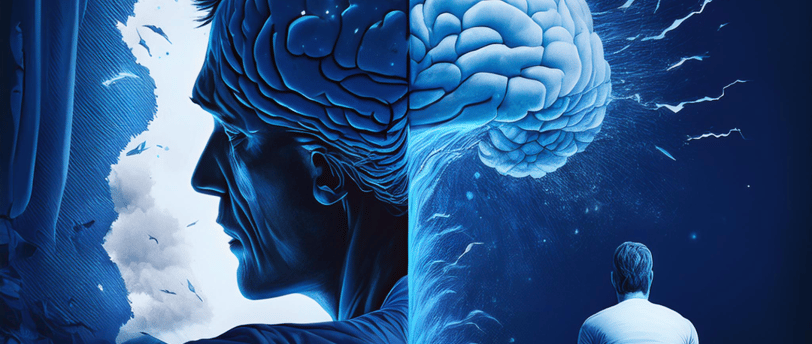MASTERING THE NIGHT: Conquer ADHD and Sleep Disorders with these Proven Tactics
Understanding the destructive relationship between ADHD and sleep disorders is the first step to managing these toxic twins and reclaiming your sleep and sanity.
SLEEP
10/19/2024


So, you’ve got ADHD, or maybe you’re just wondering if you do because your attention span rivals that of a goldfish after a triple espresso. Either way, here’s something you might not know: ADHD and sleep disorders are like those toxic exes who just can’t quit each other. They feed off one another, turning your nights into sleepless ordeals and your days into caffeine-fuelled survival missions. But don’t worry - you’re not stuck in this endless cycle forever. Understanding the connection between ADHD and sleep disorders is the first step to winning the battle on both fronts.
Having struggled with insomnia for the last 30 years, hopefully the benefit of my experience can help to shed some light on the problem. So let’s attempt to unravel this complex relationship together and uncover how you can finally get the rest you deserve and manage your ADHD like a pro.
1. The ADHD and Sleep Tango
If ADHD is the brain’s rebellious wild child, then sleep disorders are its equally unruly partner in crime. Together, they can wreak havoc on your life, disrupting your nights and leaving you dragging through the day. But there’s more to this story.
ADHD messes with your brain’s ability to regulate neurotransmitters like dopamine, which are essential for both focus and sleep. The same brain regions responsible for keeping you on task during the day also need to power down at night. When these systems are out of sync, both your concentration and sleep quality take a nosedive.
In fact, research shows that up to 47.5% (Healthline 2024 ) of people with ADHD have been prescribed sleep medication and many experience some form of sleep disorder, from insomnia to restless leg syndrome or even delayed sleep phase disorder (DSPD), which makes your body feel like it’s in a different time zone. It’s not just annoying - it’s exhausting.
2. Sleep Problems: Making ADHD Worse, One Yawn at a Time
If ADHD already makes it hard to focus, try adding sleep deprivation into the mix. Lack of sleep doesn’t just leave you tired - it supercharges your ADHD symptoms, making it even harder to focus, sit still, or manage impulsivity. It’s like trying to put out a fire by throwing gasoline on it.
Sleep deprivation impairs your brain’s executive functions, the very tools you rely on to manage ADHD - like memory, attention, and impulse control. It’s no surprise then that ADHD symptoms can skyrocket when you’re running on fumes. If you’ve ever found yourself forgetting why you walked into a room, compulsively checking emails, or wanting to crawl back under the covers by lunchtime, you’re not alone. Research confirms that sleep deprivation hits ADHD brains harder than most (Sleep Foundation 2023)
3. How to Break the ADHD-Sleep Cycle (and Reclaim Your Rest)
Here’s where we turn the tables. While ADHD and poor sleep might feel like a terrible tag team, you can break up this toxic relationship with a strategic plan. From better sleep hygiene to smarter medication management, these proven tactics can help you conquer both ADHD and sleep struggles.
Sleep Like a Grown-Up (Even If You Don’t Feel Like One)
The first step? Act like you’ve got this adulting thing down. Set a consistent bedtime and wake-up time, even on weekends. Yep, even when Netflix is calling your name. Build a bedtime routine that doesn’t involve screens or doom-scrolling. Maybe try a book, a warm bath, or some calming music. Research suggests that regular sleep habits can improve both sleep quality and ADHD symptoms.
Don’t Let Meds Keep You Up
If you’re on ADHD meds, timing is everything. Taking your medication too late in the day can keep you wide-eyed at bedtime. Talk to your doctor about finding the sweet spot when it comes to your dosage and schedule. Extended-release formulations or non-stimulant options might be worth exploring if your current meds are messing with your shut-eye.
CBT-I: Cognitive Behavioural Therapy for Insomnia
Still tossing and turning? Cognitive Behavioural Therapy for Insomnia (CBT-I) could be a game changer. CBT-I rewires your thoughts about sleep and teaches new habits to help you drift off more easily. CBT-I helps identify what we think and feel about sleep, so we can understand the behaviours and emotions that contribute to the symptoms of insomnia.
Then trough a series of sessions, typically 6 - 8, treatments will be applied according to the person’s needs. Components may include:
Cognitive Interventions - to restructure inaccurate or unhelpful thoughts about sleep.
Behavioural Interventions - to control stimuli before bed and incorporate relaxation techniques to establish healthy pre-sleep habits.
Psychoeducational interventions - A central pillar to CBT-I exploring the connection between thoughts, feelings and behaviours.
According to a study by the Sleep Foundation these techniques have proven to be particularly effective for people with ADHD with up to 80% showing improvement in sleep after completing CBT-I.
Handle Any Coexisting Sleep Issues
If you’re battling ADHD and something like sleep apnea or restless legs syndrome (RLS), you’ll need to tackle those too. Sleep apnea can interrupt your breathing during the night, leading to fragmented, poor-quality sleep. If this sounds familiar, a CPAP machine could help. And if your legs feel like they’re auditioning for a marathon at 2 a.m., you might need medications or supplements to calm them down. It is important to speak to your doctor to discuss the range of issues you are experiencing as this will influence your treatment. For example, while some medications may help with sleep, such as stimulant medications for ADHD, sleep medications may not be appropriate for everyone with ADHD.
Optimise Your Sleep Cave
According to the Berkshire Healthcare NHS Trust your bedroom should be a sleep sanctuary, not a multi-purpose disaster zone. Keep it cool, dark, and quiet. Invest in comfortable bedding and keep distractions - like your phone, far, far away. Studies show that a calm, dark environment can significantly improve sleep quality.
Exercise: Move, But Not Too Late
Exercise is your ADHD and sleep BFF. It boosts dopamine levels, which can help with ADHD, and it also improves sleep. But here’s the kicker - timing matters. Avoid intense workouts close to bedtime, as they might leave you too revved up to rest.
Snack Smart Before Bed
Late-night munchies? Try not to indulge in caffeine, sugar, or heavy meals right before bed. Instead, opt for a light snack that promotes sleep, like a banana or some turkey (hello, tryptophan!). Research has shown that eating foods with tryptophan can help promote sleepiness. For your guide to surviving the 3am cravings, why not check out - ‘Midnight Snack Attack’
Melatonin: A Little Goes a Long Way
Melatonin is a naturally occurring hormone that helps regulate the body’s circadian rhythms, which are our biological patterns that operate over a 24 hour period. Specifically, melatonin plays a vital part in the sleep-wake cycle.
If your sleep-wake cycle is out of whack, low-dose melatonin might help you reset it. But remember, melatonin isn’t candy - talk to your doctor first to make sure you’re using it correctly. According to Healthline there is a growing body of evidence to suggest that melatonin is a safe and effective supplement for improving sleep for people with delayed sleep phase disorder.
It is important to understand the limitations of melatonin supplements. While it may help you get to sleep, it will not help you stay asleep. Simply taking a little bit more will not encourage longer periods of sleep and will only increase the risk of experiencing side effects.
4. Tag Team with the Experts: A Multidisciplinary Approach
Managing ADHD and sleep disorders isn’t a solo mission. Enlist the help of sleep specialists, psychologists, and ADHD experts. Together, they can tailor a plan that addresses both issues in tandem. Regular check-ins with your healthcare team will help you fine-tune your treatment and adjust your strategies when necessary. A multidisciplinary approach increases your chances of success.
The Bottom Line
ADHD and sleep disorders can feel like frenemies you never wanted, but with the right tactics, you can tame them both. By focusing on better sleep hygiene, smart medication timing, and possibly bringing in a sleep therapist for support, you’ll find that managing your ADHD becomes a lot more doable.
Who knows? You might even start looking forward to mornings. Or at least tolerate them with fewer cups of coffee.
Notice: I am not doctor, medical professional or licensed healthcare provider. The content of this article is provided for information purposes only and is not intended to be a substitute for professional medical advice, diagnosis or treatment. The information provided in this blog is based on personal experience and research only.
References:
1. ADHD and sleep disorders prevalence: https://www.healthline.com/health/adhd/sleep-problems#diagnosis-of-sleep-disorders
2. ADHD and Delayed Sleep Problems: https://www.sleepfoundation.org/mental-health/adhd-and-sleep
3. Creating the right sleep environment and stimulus control: https://www.berkshirehealthcare.nhs.uk/media/109514310/7-adhd-guide-sleep.pdf
4. Cognitive Behavioural Therapy for Insomnia: https://www.sleepfoundation.org/insomnia/treatment/cognitive-behavioral-therapy-for-insomnia
5. Melatonin: Usage, Side Effects and Safety: https://www.sleepfoundation.org/melatonin

